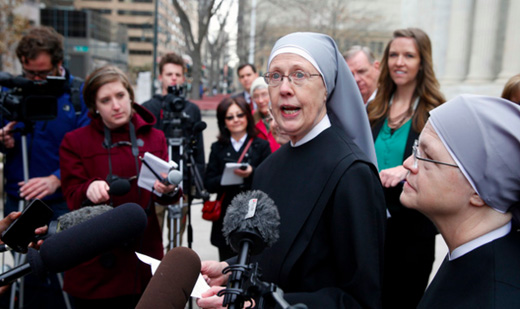
A woman’s right to birth control, along with the right to proper health coverage from her place of employment, is once again coming under fire, as the Supreme Court takes on yet another case of an organization challenging the contraception mandate in the Affordable Care Act.
On Friday, Nov. 6, the Supreme Court agreed to hear the challenge by a number of non-profit religiously affiliated groups against the mandate that requires group health plans to provide full range coverage to women that includes contraception.
This will be the fourth challenge to the Affordable Care Act heard by the Supreme Court, and the second challenge the court is hearing regarding the part of the act that mandates provision of contraceptive care to women.
Many will remember that in 2012, Hobby Lobby, a company owned and operated by a religious couple, David and Barbara Green, challenged the requirement for them to provide contraception coverage to their employees. The Affordable Care Act initially required organizations of a certain size to cover FDA-approved contraceptives in their insurance plans.
The Greens claimed that four of the 20 listed contraceptives violated their religious beliefs because they might prevent a fertilized egg from implanting in a woman’s uterus. The couple claimed that although they weren’t taking the drugs themselves, they felt morally accountable for paying for their employees to do so. The Supreme Court ruled in favor of Hobby Lobby.
Leading the group of religious non-profit organizations challenging the contraceptive mandate this second time around are The Little Sisters of the Poor. They want total exemption, the exemption that is granted to churches under the mandate. They say this would allow them to play no role whatsoever in the process of making birth control pills and devices available to their employees or students.
Mark Rienzi, senior counsel of the Becket Fund for Religious Liberty, said in defense of the organization; “The Little Sisters spend their lives taking care of the elderly poor — that is work our government should applaud, not punish… The Little Sisters should not have to fight their own government to get an exemption it has already given to thousands of other employers, including Exxon, Pepsi Cola Bottling Company, and Boeing. Nor should the government be allowed to say that the Sisters aren’t ‘religious enough’ to merit the exemption that churches and other religious ministries have received.”
Currently religious nonprofit organizations have a special accommodation, provided after the Supreme Court ruling in favor of Hobby Lobby. The special accommodation allows organizations to fill out a form explaining their objection to providing coverage- which then allows a third-party organization to provide the coverage instead.
The Little Sisters, along with the other six plaintiffs in these cases, claim this is unsatisfactory because simply filling out the form puts them in the position of making it easier for their employees to receive birth control services.
As Paul Clement, the lawyer representing the religious nonprofits, said the groups “object to facilitating, or being complicit in, or paving the way,” for contraception to be available to their employees, even by giving the responsibility of coverage to a third party.
On social media users are reacting to the news with a variety of thoughts. The hashtag #NotMyBossesBusiness continues to grow in popularity, as users speak out against employers having a right to prevent women from obtaining birth control.
The Secular Coalition stated, “Real religious freedom is about protecting conscience, not allowing you to impose it on others. #NotMyBossesBusiness.” While individual Olivia Shestopal noted, “As though one #HobbyLobby debacle wasn’t enough. #NotMyBossesBusiness .”
The vice president of the National Women’s Law Center, Gretchen Borchelt, went on record as saying, “Women deserve insurance coverage of birth control no matter where they work or go to school… It’s unfair and harmful for some employers and schools to use their religious beliefs to deny women vital health care that also makes them more economically secure. The Supreme Court must stop these efforts to undermine women’s health and ensure that women continue to have the seamless access to birth control that they are entitled to under the law.”
If the Supreme Court rules in favor of The Little Sisters of the Poor and the other plaintiffs it would mean another blow to the Affordable Care Act and women’s right to full health coverage. The court will begin hearing the case early next year, with a ruling expected by June.
Photo: Brennan Linsley/AP












Comments